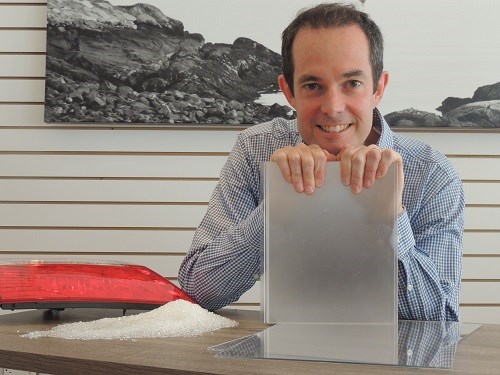Aussie Additives Newcomer has Alternative to Hardcoating for Mar/Scruff Resistance of Polar Plastics
Starting with acrylic automotive parts, TenasiTech is focussing its novel plastic additives activity to North America, Europe, Asia.

Australian plastic additives startup TenasiTech Pty. Ltd. (U.S. office in Boston, Mass.) has been further expanding and globally marketing its patented nanoadditives first developed six years ago at Queensland University. Solid-TT is a family of surface-treated nanoclays that have been shown to provide enhanced mar/scruff resistance of acrylic polymers and have significant potential for use in several other polar polymers ranging from PET to TPUs, and is positioned as an alternative to hardcoating in a broad range of applications.
CEO Richard Marshall says the company has been manufacturing the proprietary additives via toll compounding in the U.S. within the last three years, and while it maintains its Australian R&D activities and official headquarters, its thrust of activities are in North America, Europe, and Asia. “The intellectual property of the patents covers a wide range of morphology in terms of the size of the particles and treatments we put on them.” Solid-TT comes in easy to handle powder form, similar to the consistency of talcs.
TenasiTech’s initial focus has been on acrylic in applications such as injection molded automotive door pillars and extruded sheet for building interior decoration, for which trials at OEMs are underway. The company has also started internal testing of the nanoadditives with nylon 12 and other nylons, as well as TPUs. Marshall indicates that they are ready to move into PC and PET for applications ranging from automotive, consumer electronics and industrial electronics such as touch screens and control panels.
“We are an alternative for mar and scruff resistance for customers who want to avoid the significant investment required for expensive hardcoating processes. Our additive is not designed to replace hardcoating where that investment has already been made such as automotive front headlamps.” However, Marshall says there is a whole market of products where such high levels of performance and handling is overkill. The Solid-TT additives are tailored with surface modifications that enhance the dispersion of the additives within high-polarity plastics. Compared to hardcoating, they are less costly, provide more consistent results and, as such, a much lower reject rate, according to Marshall.

Related Content
-
Injection Molded Tape and Resin “Sandwich” Technology Debuts
During its Mobility Days in Austria, Engel and KTM Technologies debuted an all-plastic molded motorcycle seat base produced via a tape-sandwich process that can run in a standard molding process.
-
Atop the Plastics Pyramid
Allegheny Performance Plastics specializes in molding parts from high-temperature resins for demanding applications as part of its mission to take on jobs ‘no one else does.’
-
Design Optimization Software Finds Weight-Saving Solutions Outside the Traditional Realm
Resin supplier Celanese turned to startup Rafinex and its Möbius software to optimize the design for an engine bracket, ultimately reducing weight by 25% while maintaining mechanical performance and function.
















